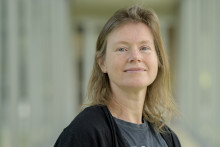Sharma explains, `All MSc students in business must write a thesis based on a practical assignment.' From the beginning, they must be on the look-out for companies and internships. Academic supervisors usually lend a hand, guiding students as they search for appropriate positions. She describes it as a `two-way process,' whereby a company offers a project, a master's student gets an interview; and together they determine whether the project in question is suitable for the student and his or her research interests. In Sharma's case, it was a perfect match with Grolsch.
Why Grolsch? Koninklijk Grolsch N.V. (Royal Grolsch N.V.) has long impressed Sharma; `Grolsch is one of the biggest companies in eastern Netherlands. I like the fact that it is a traditional company, established in 1615, which makes a product that is for and of all time. It was granted royal status in 1995. I always thought it would be nice to do an internship in a company that was so famous. I like that it sticks to certain principles: integrity, quality, authenticity and the distinctive taste of its beer, for example. Moreover, it is a highly innovative and creative company that along with its home market in the Netherlands is present in more than 50 countries worldwide, such as the US, UK, Canada, New Zealand and France.'
Sharma describes her thesis as a `project to develop a model that would provide support to the global partners of Grolsch in their business operations. The model would serve as a long-term strategic framework as well as a practical hands-on guide in matters regarding the development of the Grolsch brand.' Essentially, from June 6 to October 31, Sharma works for Grolsch, under the supervision of the brand manager Marc van Lierop, writing up the guide for Grolsch, while preparing a report of the process it takes to create the guide for her UT supervisor, S.J. Maathuis. She aptly defines writing a thesis as a `whole thinking process, a sort of intellectual trial and error.' The success of her thesis depends on the guide itself as well as whether she did what she had intended to do.
As for Sharma's responsibilities, she sheepishly discloses, `I attend to activities related to my thesis, but they are confidential. Actually even the report has to be confidential, according to my contract with the UT and Grolsch. I cannot publish anything without permission from my supervisor at Grolsch.'
Like many international students at the UT, she is not fluent in Dutch. She confides, `For foreign students, finding an internship in the Netherlands can be difficult because of the language barrier.' Nonetheless, this sharp, spunky young woman is not letting such an excellent linguistic opportunity pass her by: `The assignment is in English, so I am expected to speak English. In general, I discuss my work in English, but I am also trying to improve my Dutch - it's my own initiative. My Dutch officemate encourages me to speak Dutch, but there is no pressure. There is a very relaxed linguistic atmosphere.'
So far, so good, reports Sharma. `I would like to work in a company like this. It is a strong, yet flexible company. People work hard, but they are easy with each other. I feel very welcome at Grolsch.'
By the way, what about that funny name which virtually no foreigner can pronounce? Sharma explains that the name derives from the town of its original location: Groenlo, which was locally dubbed Grol or Grolle; hence the adjectival form, Grolsch.

Seema Sharma (Photo: Arjan Reef)







